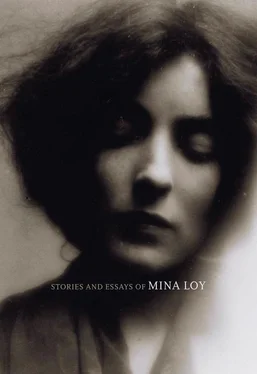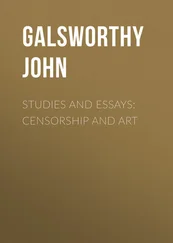Mina Loy - Stories and Essays of Mina Loy
Здесь есть возможность читать онлайн «Mina Loy - Stories and Essays of Mina Loy» весь текст электронной книги совершенно бесплатно (целиком полную версию без сокращений). В некоторых случаях можно слушать аудио, скачать через торрент в формате fb2 и присутствует краткое содержание. Год выпуска: 2011, Издательство: Dalkey Archive Press, Жанр: Современная проза, на английском языке. Описание произведения, (предисловие) а так же отзывы посетителей доступны на портале библиотеки ЛибКат.
- Название:Stories and Essays of Mina Loy
- Автор:
- Издательство:Dalkey Archive Press
- Жанр:
- Год:2011
- ISBN:нет данных
- Рейтинг книги:3 / 5. Голосов: 1
-
Избранное:Добавить в избранное
- Отзывы:
-
Ваша оценка:
- 60
- 1
- 2
- 3
- 4
- 5
Stories and Essays of Mina Loy: краткое содержание, описание и аннотация
Предлагаем к чтению аннотацию, описание, краткое содержание или предисловие (зависит от того, что написал сам автор книги «Stories and Essays of Mina Loy»). Если вы не нашли необходимую информацию о книге — напишите в комментариях, мы постараемся отыскать её.
Stories and Essays of Mina Loy
Stories and Essays of Mina Loy — читать онлайн бесплатно полную книгу (весь текст) целиком
Ниже представлен текст книги, разбитый по страницам. Система сохранения места последней прочитанной страницы, позволяет с удобством читать онлайн бесплатно книгу «Stories and Essays of Mina Loy», без необходимости каждый раз заново искать на чём Вы остановились. Поставьте закладку, и сможете в любой момент перейти на страницу, на которой закончили чтение.
Интервал:
Закладка:
Manuscript long ago lost.

Pazzarella, arisen, her exhausted voice transformed for the future to the trill of a bird, is twittering to the dawn. To my surprise, like the hero of an ancient fable unexpectedly endowed with the understanding of the conversation of animals, I find no difficulty in interpreting the language of a creature so dissimilar to myself.
The End.
Note sent with M.S.S.
Sympathetic Enemy
One night I set to work and composed the gigantic opus for the vindication of feminine psychology with which I had threatened you. Whether it is that truth is more powerful than determination, or fantasy less fantastic than truth, or that woman, being incapable of thinking, reads the thoughts of others. However that may be, this is how it turned out.
Your affectionate
PIERO & ELIZA
Like a drop of arsenic falling upon clay, he appeared among the lethargic clients of the café, as they crouched at sundown over their cheap vermouth.
His face was painted a greenish white, a mask of experimental irony, on which he pushed his bands of black eye-brow upwards to an insolent interrogation, crushing his eyes to slits of quizzical survey. His mouth was an arrogant crimson blot, and he cherished an ebony cane with his white kid gloves.
“ Gia ,” said the camerieri , “he used to be a musician, but he is now a gentleman, for his uncle died and bequeathed to him his vineyards.”
For perhaps half a dozen evenings he pirouetted among the café tables, wriggling in his frock coat which tweaked his waist and spreading to broad lapels bore in the buttonhole a pistachio-coloured carnation.
And always as he left he would bestow upon the company an impenetrable glance of assumed evil.
He had returned from Paris, a solitary decadent having lost his ambiente .
Eliza Blane was a middle-aged English girl of middle-class morality, with a hankering after the arts as a social outlet.
Into her life he frolicked like a sinister kitten.
Every woman continues to want a man in her life, and after some decades of inhibition her desire seeks merely a living symbol of unproven curiosities. In old maidenhood she achieves a paralysis of the instincts, with the result, to put it simply, that should Eros approach her, “she wouldn’t know what to do.”
There was something in the arsenical Piero that wanted a mother; something in Eliza that wanted a lover — a lover who would open the flood-gates of her fantasy, and leave her body where it belonged — rigid under the ashes of her accustomed inhibitions.
Piero played to her his mincing music, and tended this platonic conquest with playful quirks and humouring caresses.
They became inseparable.
She warmed the blast of emptiness that swept her palazzo to a home atmosphere, where she fed Piero with zeal and performed the ceremony of darning his socks.
Eliza, in the Venetian moonlight, romanced to him of the purely spiritual obligations of love, which he accepted graciously as a hitherto unsuspected form of abstract vice.
Gradually they gathered round them a scattering of expatriated bachelors, deeply attached to their furniture, who always delighted to show Eliza a new solitaire, while Piero composed.
Piero was the youngest among the bachelors, and his achievement of a transcendental family life lent him a certain augustness among them.
While through them he acquired a modified aspect of self advertisement; for they taught him that he who treads tactfully, may keep one foot in society and one in Fairyland.
Eliza abetted this innovation of compromise with her middle-class maxims. So Piero washed his face and wore tweeds which she chose for him.
Theirs was now a delightful life, Piero placed “Beauty” precisely in the palazzo; together they collected its antique forms, and together they would stand off and admire them in those nooks to which they had been appointed — and always Piero found everything “too exquisite.”
Eliza was not neglected, Piero and an intimate artist designed costumes for her; they would stand her in the centre of the music room, and trip around her entranced with draping striped crêpe and monkey fur upon her; the attendant dressmaker bowed her head and said “ sicuro ,” while Piero’s manicured fingers depicted perfection.
There she stood, like a mummy resuscitated with a fictitious breath of flattery. The fearful tension of her eyes was bordered with very black fringes, and over the quivering tendons of her insteps was stretched expensive silken hose. Piero twisted her around and about —like some marionette; while the dressmaker nodded again, “ sicuro. ”
Eliza took her headaches to lie for a nap of an afternoon, to stare through the pastel surface of the wall and the dim colour of the flower of love in the mist of the tapestry.
Of those rooms which she entered alone the planes of the walls seemed to turn inside out to withhold the fulfilment of life from her ———she could overhear the muted voices of the bachelors seeking the secluded study and the loggias.
When they returned to her table they stole into the atmosphere with their recollections, like soft cats, heavy with satisfaction.
After dinner they purred over ephemeral scandals in which the gentler sex is so inevitably involved.
There was no gusto in their laughter, no resentment of the frailty of woman, their comments on her charms were never warm.
For their eyes were preoccupied, as with the inner realisation of the wearer of a mask; while a bachelor would steal upon the insinuate silence with an anecdote.
“ —— ——she invited the young attachés to dinner
———a shaft leading from a trap door in the ceiling to the roses banked in the centre of the dinner table ————and down slid Lady Pink ———but only Lady Pink ——.” The bachelor wafted his hands from his flanks, invoking Eve — but his gestures displayed the anomaly of an allusion to his own graces rather than hers. As of life so of art, they spoke with an unintentional aloofness, as those who speak in the language of signs to the deaf and dumb.
Despite the spiritual obligations, the soul of Piero flowed beyond Eliza’s imagining. Flowed with the tropical mystery of an unnavigable Amazon, overhung by an exotic tangle of his smiles and hints.
Through all her comradely and inspiring traffic with them, Piero and the bachelors impressed Eliza as the incognito guardians of some holy bread. When they spoke they swallowed preparedly as if to rid speech of something incommunicably sweet and secret, which their mouths must never surrender.
Eliza’s question of the bachelors’ significance —her curiosity, materialized to an almost palpable entity passing from Eliza to move among them, stroking their consciousness beseechingly —————they condescended to answer with conundrums of discretion.
Eliza had been reared by a great aunt who, steeped in melancholia, warned her of hell, and lauded the unconditional surrender of being “sincere.”
From this rudimentary religious influence she had graduated to spiritualism and the popular occult.
She cultivated her aura like a garden of unscented flowers.
But Eliza by dint of horoscopes and séances was reaching a higher plane ——some plane on which psychic phenomena, like orgasms, so tantalisingly suggest themselves.
Her body became hollow ——she could feel the wind of the spirit blowing about in it, stemming her blood and parching her skin.
The fearful tension of her eyes ——
There are crises in the life of the chaste woman, when the fetishes of savage ancestry and the Christian devil, together with all the weird personifications into which the unappropriated sex force transforms itself, fall upon her taut nerves to rend them in the stillness of the night.
Читать дальшеИнтервал:
Закладка:
Похожие книги на «Stories and Essays of Mina Loy»
Представляем Вашему вниманию похожие книги на «Stories and Essays of Mina Loy» списком для выбора. Мы отобрали схожую по названию и смыслу литературу в надежде предоставить читателям больше вариантов отыскать новые, интересные, ещё непрочитанные произведения.
Обсуждение, отзывы о книге «Stories and Essays of Mina Loy» и просто собственные мнения читателей. Оставьте ваши комментарии, напишите, что Вы думаете о произведении, его смысле или главных героях. Укажите что конкретно понравилось, а что нет, и почему Вы так считаете.












